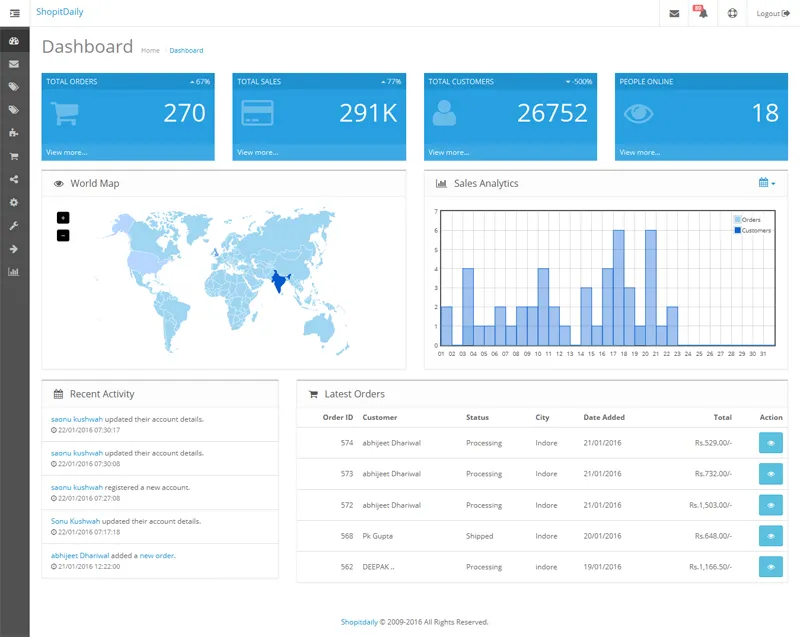Indore-based ShopitDaily aims to be the Uber of online grocery delivery
ShopitDaily, a hyperlocal grocery delivery platform, received its first order within the first two hours of its going on air in a Tier II city. The order was placed by Saumya Joshi from Indore, who became their loyal customer. A package with 37 different items had to be collated, packed, and delivered.
The founders of ShopitDaily had never thought in their wildest of dreams of such a dramatic beginning. But Indore’s customers surprised them with a response no less than phenomenal. Launched in August 2014, ShopitDaily now has a consumer base in Indore and Vadodara and is catering to more than one lakh orders per month.

ShopitDaily offers a 90-minute-delivery proposition to customers within 25 kilometre of city limits. The service also caters to canteens at corporate houses and companies along with retail segment. Apart from online, the service can be availed over phone and WhatsApp.
Another Grofers on the block?
“We are similar to big players like Grofers and Big Basket in terms of the hyperlocal space, but different in both inventory and market place model. Contrasting with our online origin, we also entertain orders on offline mode like phone calls and ensure a maximum mental repose to our customers,” informs Abhishek Bhatt, Co-founder of ShopitDaily.
“We are focussing on Tier II cities and plan to target upcoming smart cities like Bhopal, Udaipur, Dewas, Ujjain, Surat, Rajkot, Jaipur apart from Indore and Vadodara. We aspire to be the Uber of Online Grocery of Tier II cities. We are offering discounts of marketing operating prices unlike other players who offer discount on MRP,” shares Co-founder Saurav Shrivastava.
Despite the fact that now they have enough players in the market to elevate their standards of service, back in 2014 the founders had conceived the startup keeping a major pain-point in mind. “There’s no doubt that with the increasingly busy lives, grocery shopping takes away a lot of time, petrol and eventually adds to overall expenses. We wanted to eradicate the daily pain of groceries purchase, thereby giving Kirana shopping an entirely new face,” adds Abhishek.
Common wavelengths and a Steve Jobs quote
Both Saurav (28) and Abhishek (30) have finance background and worked for Aditya Birla Group and ABN AMRO N.V., respectively. They happened to meet in Nasik through some acquaintance. The frequency of their thoughts and ideas matched perfectly. Both felt the need for addressing a common pain-point in Tier II cities.
However, scaling up from a city like Indore was not easy. The founders have had their fair share of struggles. “In the 18 operational months, we understood that running a startup is not easy, especially in a Tier II city. We understood that it’s hard to retain people in smaller cities. So we found ways to build a great team. Also, our biggest learning so far is of team retention during phases of hardships, motivating each individual and making them realise their capabilities, thereby keeping their focus clear on organisational goals and objectives,” adds Abhishek.
“There is a famous quote of Steve Jobs – Your work is going to fill a large part of your life, and the only way to be truly satisfied is to do what you believe is great work. And the only way to do great work is to love what you do. These words continue to fill us with more and more power and push us to the highest extent of our potentials,” says Saurav.
While in most cases, family members have difficulty accepting the viability of startup ideas, Abhishek was pleasantly surprised by the support lent by a close relative Sunita Paranjape, who soon became one of the key people at the company. Having strong social contacts, Sunita helped in onboarding clients initially through word-of-mouth referrals.
“Along with Sunita, I am also thankful for the way my wife Vibha and Saurav's wife Akansha took our ideas. Both the women got themselves actively involved and became strong pillars at ShopitDaily,” adds Abhishek.

ShopitDaily has a 70:30 revenue model. “We keep an inventory of 70 percent product variants and rest 30 per cent is the marketplace model. In marketplace model, we keep our margins fixed with the vendor, which adds to our revenue. However, in inventory model we make a net margin of around seven to eight per cent. We reached the breakeven point in September2015, and we are expecting good profits this fiscal year,” says Saurav.
ShopitDaily recently crossed the mark of one lakh customers per month. “Moreover, we have a registered user base of about 25,000 people.
Ken Research report states that Indian online grocery market is set to hit 2.7 billion mark by FY2019, following the surge in number of players operating in the industry. The report also states that smart cities in India will lead operations of online grocery shopping, but will reach a saturation in metropolitan cities.
“The price sensitivity is marginally higher in Tier I and III cities as compared to metros. Our biggest challenge in the future would still be to make people in these cities comfortable with online grocery concept. Moreover, the Tier II cities are on their way to be smart cities, so delivering groceries within expanding geographical periphery is another foreseen challenge,” says Saurav.
Some of the active players in this segment include Nagpur-based GetNowAt, Lucknow-based Ghar Baithay, Trivandrum-based Kada, Sagar-based Sagarkirana, and Nasik-based Gokirana.
ShopitDaily plans to launch its services in five more Tier II cities by September 2016, with a monthly target of five lakh orders.







